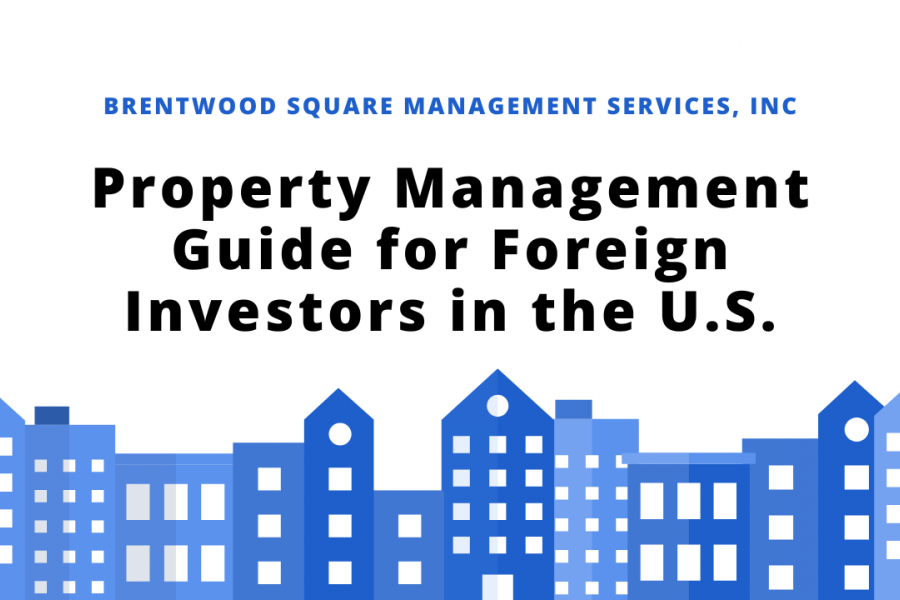
- U.S. real estate offers international investors the chance to grow their portfolios in a stable and rewarding market.
- Setting up the right team and ownership structure early on helps make managing property from abroad much smoother.
- Understanding U.S. tax rules and local regulations is essential for protecting your investment and making the most of available opportunities.
- Leveraging technology and local expertise can keep your properties running smoothly and help you build long-term success.
Investing in U.S. real estate offers foreign investors an exciting opportunity to grow wealth, diversify their portfolios, and tap into one of the most stable property markets in the world.
Brentwood Square Management put together this guide to help international buyers understand the essential steps, responsibilities, and best practices of owning and managing property in the United States. With growing interest in regions like Tennessee, knowing how to navigate the management side of your investment can make all the difference in long-term success.
Why Foreign Investors Are Drawn to U.S. Real Estate
Foreign investors are often drawn to the U.S. for its reputation as a safe and appreciating market. The combination of a robust legal system and a strong rental demand makes American real estate especially appealing.
In addition, the variety of markets from affordable up-and-coming cities to luxury coastal hubs allows investors to tailor their strategies to fit their goals, whether they are focused on long-term appreciation, steady rental income, or short-term vacation rentals. For many, the ability to invest in a transparent, rules-based environment is a welcome contrast to less predictable markets abroad.
Establishing a Remote Property Management Team
Managing property from another country presents unique challenges, but with the right local team, it becomes entirely feasible. A trusted property management company plays a central role, handling everything from rent collection to maintenance coordination, tenant screening, and routine inspections.

Brentwood Square Management supports international investors, offering clear communication, detailed reporting, and proactive problem-solving. Combining professional expertise with modern software solutions ensures that all aspects of the property are well-managed, even from thousands of miles away.
Want help managing your U.S. investment from abroad? Let’s talk about how we can support your goals.
Choosing the Right Ownership Structure
Selecting the proper ownership structure is a crucial early decision for foreign investors. Many choose to form a limited liability company (LLC) to hold their U.S. properties because of the liability protection and pass-through taxation it offers.
Others may explore setting up a corporation or a limited partnership, depending on the investment strategy, number of stakeholders, or plans for eventual resale. The right structure can help reduce tax exposure, simplify estate planning, and protect personal assets.
Understanding U.S. Taxes and Withholding Rules
Taxes are a central part of any foreign real estate investment, and U.S. tax laws have specific rules for nonresident owners. To take advantage of deductions, including expenses like mortgage interest, property taxes, and maintenance, foreign investors must elect to file an annual U.S. tax return.
Additionally, when it’s time to sell, the Foreign Investment in Real Property Tax Act (FIRPTA) requires that a portion of the sales proceeds be withheld to cover potential tax liabilities. Having an Individual Taxpayer Identification Number (ITIN) and working with qualified professionals helps ensure compliance and can potentially lead to tax savings.
Navigating FIRPTA and Withholding Requirements
One of the more complex aspects of selling U.S. property as a foreign owner is complying with FIRPTA. This law mandates that buyers withhold a portion of the gross sales price to cover potential tax obligations of the foreign seller.

Although it’s possible to apply for a reduced withholding or refund after the sale, proper planning is critical to avoid surprises. Some investors opt to structure their ownership through domestic entities, which can offer certain advantages under FIRPTA rules, but this must be balanced with broader tax and operational considerations.
Leveraging Technology for Efficiency
Technology has transformed property management, making it significantly easier for foreign investors to oversee their properties from afar. Today’s software platforms allow owners to monitor rental income, review maintenance requests, access lease agreements, and track financial performance from virtually anywhere.
These tools also improve communication between property managers, owners, tenants, and service providers, helping ensure that operations run smoothly. By offering real-time updates and centralized information, modern technology gives international investors a clear and efficient way to stay connected to their investments, no matter where they are in the world.
Avoiding Common Pitfalls
Foreign investors sometimes underestimate the importance of local expertise, assuming that a strong market or appealing property will automatically deliver good returns. However, without an understanding of local regulations, it’s easy to overlook important requirements, underinsure the property, or skip essential tenant screening steps.

Poor cash flow management can also become an issue, particularly when facing unexpected vacancies or repair costs. Working with knowledgeable local professionals and having clear systems in place can help investors avoid these common pitfalls, protect their investments, and support long-term success.
Choosing the Right Market
Selecting the right location is often just as important as managing the property itself. Investors should look beyond surface-level numbers to understand neighborhood trends, rental demand, local regulations, and long-term growth potential. Some states have more landlord-friendly laws, while others prioritize tenant protections, and tax rates can vary widely from one area to another.
For foreign investors, conducting thorough market research and consulting with local experts can help identify areas that align with their risk tolerance, investment goals, and timeline. Whether pursuing high-yield multifamily properties or stable single-family rentals, informed decisions are key to building a successful real estate strategy.
Curious about how we help investors choose the right location and property? Learn more about our team and approach.
Building Long-Term Wealth
Real estate investing isn’t just about the immediate income; it’s about creating long-term value. Foreign investors can take advantage of strategies like 1031 exchanges to defer capital gains taxes by reinvesting in similar properties. Diversifying across different asset types and geographic areas can also help balance risk and capture varied growth opportunities.

Regularly reviewing portfolio performance and adjusting as needed ensures that your real estate holdings continue to meet your financial goals. With the right partners, international investors can build a resilient, high-performing U.S. portfolio that serves them for years to come.
Conclusion
Investing in U.S. real estate as a foreign buyer offers enormous potential, but it also comes with complexities that require careful planning and professional management. From choosing the right ownership structure and navigating taxes to maintaining properties and maximizing returns, every step matters.
Brentwood Square Management is here to help you every step of the way, providing the expertise, tools, and local knowledge you need to succeed. Ready to take your U.S. real estate investments to the next level? Contact Brentwood Square Management today and let’s make your international investment goals a reality.
